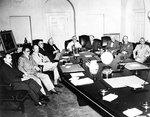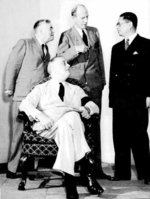![Lord Halifax file photo [5287] Lord Halifax file photo [5287]](/images/person_halifax1.jpg)
Halifax
| Surname | Wood |
| Given Name | Edward |
| Born | 16 Apr 1881 |
| Died | 23 Dec 1959 |
| Country | United Kingdom |
| Category | Government |
| Gender | Male |
Contributor: C. Peter Chen
ww2dbaseEdward Frederick Lindley Wood was born the fourth son of the 2nd Viscount Halifax. All children of the family suffered health issues: all three older brothers died before their time, and Wood suffered the disability of a lack of a left hand. He was educated at Eton College and Christ Church of the University of Oxford, both in England, United Kingdom. Between 1910 and 1925, he served in the Parliament, representing the constituency of Ripon, North Yorkshire, England. During WW1, he served in the rear with the Yorkshire Dragoons at the rank of major. Between 1922 and 1924, he served as the President of the Board of Education under Andrew Bonar Law. Between 1924 and 1926, he was appointed the Minister for Agriculture under Stanley Baldwin.
ww2dbaseBetween 1 Apr 1926 and 1931, Wood served as the Viceroy of India; the appointment was personally made by King George V, no doubt with his family's history in mind (his grandfather had been Secretary of State for India). The appointment for India also brought upon him the title of Baron Irwin (since 1925). Faced with an Indian independence movement, he was originally chosen as a religious man to deal eye-to-eye with Mahatma Gandhi, but for the first 19 months of his time in India, he ignored him. In fact, he generally excluded Indians from most portions of government, which angered Indians, and the independence movement turned violent. Lord Irwin was forced to make concessions, which was viewed as too excessive by the British leaders and not serious enough by the Indian leaders. Without effective support from London, Lord Irwin had little choice but to declare emergency powers and placed Gandhi and other Indian leaders under arrest, which still helped little. In Jan 1931, he signed the Delhi Pact which promised a round table discussion (later named the Round Table Conference) which eased tensions. On 20 Mar 1931, he publicly praised Gandhi's dedication and patriotism. In the following month, he returned to England.
ww2dbaseReturning to education, Lord Irwin became the Chancellor of Oxford University in 1933. In 1934, he inherited the title Viscount Halifax from his father.
ww2dbaseLord Halifax was the Secretary of State for War in 1935, Lord Privy Seal between 1935 and 1937, and the Lord President of the Council between 1937 and 1938. In 1938, he served as the Foreign Secretary. His political view for continental affairs was that of appeasement, having no objections with the German re-armament of Rhineland. When Germany annexed Austria and then Czechoslovakia, it was Lord Halifax's view that Germany would not start a war if it was given enough to satisfy its ambitions, despite his own doubts on losing Czechoslovakia as a staunch ally against German expansion. When Prime Minister Neville Chamberlain stepped down, Lord Halifax was viewed as a favorite successor, but he announced that he was not seeking the position; Winston Churchill was chosen instead, who kept Lord Halifax as his Foreign Secretary.
ww2dbaseOn 24 Jan 1941, Lord Halifax arrived at the Chesapeake Bay in the United States aboard battleship HMS George V. President Franklin Roosevelt arrived in person to welcome the new British ambassador. Instead of getting to work immediately, however, he partook fox hunting trips in Virginia in his first few weeks in the United States. Despite his initial reputation as yet another stiff and distant British aristocrat, the Americans soon realized he was an effective leader of the British propaganda machine in Washington, DC. By mid-1941, he was running marketing campaigns around the American capital city to gather support for Britain's war effort. "At one point, Halifax had a truck that had been dented by German bombs shiped over from London, placed signs on it saying 'Buy British,' and sent it off around the city." An old man by now, however, he was no longer the authoritative figure he once was as the Viceroy of India. In 1942, he morned the loss of one of his children, who died in combat. Churchill's preference of keeping tight personal contact with Roosevelt meant Lord Halifax's post as ambassador was much less important, and his influence waned as the war went on. In late 1942, he asked to be relieved, but the request was denied.
ww2dbaseAfter the war, Lord Halifax retired from public service in 1946. He passed away at his estate at Garrowby in 1959.
ww2dbaseSource: Wikipedia.
Last Major Revision: Nov 2007
Halifax Interactive Map
Photographs
 |  |  |  |
Halifax Timeline
| 16 Apr 1881 | Edward Wood was born. |
| 19 Nov 1937 | Lord Halifax met Adolf Hitler at Berchtesgaden in southern Germany; he failed to achieve any official agreements with the German leader, and gave Hitler the confidence that the current British government would be likely to concede to future German demands. Upon his return, Halifax reported that Hitler did not appear to be pursuing war. |
| 19 Mar 1939 | British Secretary of State for Foreign Affairs Lord Halifax explained to the Soviet ambassador in the United Kingdom that the reason for the rejection for Joseph Stalin's call for a multi-power conference to contain Germany was due to the lack of available personnel to embark on these negotiations. |
| 20 Jul 1939 | British Foreign Secretary Halifax met with Swedish businessman Birger Dahlerus in London, England, United Kingdom, telling him to approach Hermann Göring for possible Anglo-German negotiations to avoid war. |
| 4 Jan 1940 | British Foreign Secretary Lord Halifax sent a diplomatic note to Norway, with a copy sent to Sweden, asking for permission to send British Royal Navy ships into Norwegian waters, citing German sinking of British merchant ships. |
| 22 Jan 1940 | British Foreign Secretary Lord Halifax criticized First Lord of the Admiralty Winston Churchill's speech of 20 Jan 1940, noting that by stating support for Finland in the war with Soviet Union he was meddling with foreign policy. |
| 14 Mar 1940 | British Foreign Minister Lord Halifax began to ask Finland to return some of the supplies that the British had given to Finland for the Winter War. He retracted the request shortly after Finnish Ambassador to London G. A. Gripenberg reminded him that Finland had paid for the relatively small amount of goods that Britain offered. |
| 22 Jun 1940 | British Foreign Secretary Halifax had his undersecretary Richard Butler contact Swedish Minister in London, England, United Kindom Björn Prytz for a possible Anglo-German negotiations. Germans intercepted Prytz's report back to Stockholm and concluded that the war with Britain was likely to end by the end of the summer. |
| 22 Jul 1940 | British Secretary of State for Foreign Affairs Lord Halifax rejected Adolf Hitler's proposal for peace of 19 Jul 1940. "No one here wants the war to go on for a day longer than is necessary. But we shall not stop fighting until freedom, for ourselves and others, is secure." This was a departure from his previous stance, urging Winston Churchill to negotiate a peace with Germany. |
| 24 Jan 1941 | Lord Halifax arrived at Chesapeake Bay, Maryland, United States aboard battleship HMS King George V. He had arrived to take up his new post as the British ambassador to the United States. |
| 23 Dec 1959 | Edward Wood passed away at Garrowby Hall, Yorkshire, England, United Kingdom. |
Please consider supporting us on Patreon. Even $1 per month will go a long way! Thank you. Please help us spread the word: Stay updated with WW2DB: |
Visitor Submitted Comments
19 Oct 2024 01:59:38 AM
My GrandFather, Captain George Albert Lyon became very close friends during the war with Lord Halifax, Richard; they where together during the nazi attack when he was wounded.
5 Jan 2025 02:27:20 AM
The only one with sense in that period. His peace would have saved Europe. Now we have the replacement instead.
All visitor submitted comments are opinions of those making the submissions and do not reflect views of WW2DB.
» First Washington Conference
Document(s):
» No. 10: Speech by the Secretary of State for Foreign Affairs in the House of Lords
» No. 128-133: King Léopold III's Appeal for Peace and Responses
» No. 134-138: Belgian-Dutch Joint Mediation Attempt
» No. 139-142: Appeal for Peace by Pope Pius XII
» No. 23: Message from Viscount Halifax to Sir N. Henderson
» No. 25: Speech by the Secretary of State for Foreign Affairs at Chatham House
» No. 27-28, 30, 41-42, 45-47, 50-51: Messages between Kennard and Halifax on Danzig
» No. 32, 34, 38, 39, 43: Messages between Norton and Halifax on Danzig
» No. 36 & 48: Messages from Henderson to Halifax on Danzig
» No. 57-59, 69, 75, 76, 79-83, 87, 88, 91, 92, 99, 102, 103, 109-111, 114, 118: Messages Between Henderson and Halifax on Potential War
» No. 62: Message from F. M. Shepherd to Halifax
» No. 63, 66, 67, 70-73, 84-86, 90, 93-97, 100, 101, 112, 113, 115: Messages between Kennard and Halifax on Potential War
» No. 65. Speech by the Secretary of State for Foreign Affairs in the House of Lords
Related Books:
» Ministers at War: Winston Churchill and His War Cabinet
- » 1,167 biographies
- » 337 events
- » 44,642 timeline entries
- » 1,244 ships
- » 350 aircraft models
- » 207 vehicle models
- » 376 weapon models
- » 123 historical documents
- » 261 facilities
- » 470 book reviews
- » 28,517 photos
- » 365 maps
Lt. Gen. Lewis B. "Chesty" Puller, at Guadalcanal
Please consider supporting us on Patreon. Even $1 a month will go a long way. Thank you!
Or, please support us by purchasing some WW2DB merchandise at TeeSpring, Thank you!













19 Nov 2007 02:34:42 PM
Hitler may plant the swastika where he will, but unless he can sap the strength of Britain, the foundations of his empire are based on sand...Lord Halifax (Broadcast: 22 July 1940 in response to Hitlers appeal for peace)